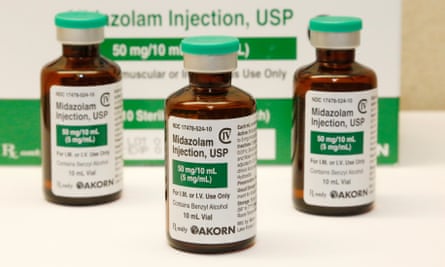Death penalty states in the US are stockpiling medicines for lethal injections that could save the lives of hundreds of coronavirus patients were they released for medical use.
A group of prominent medical practitioners and experts has issued an appeal to capital punishment states to release their stocks of essential sedatives and paralytics that they hoard for executions. The drugs are among the most sought after in hospital intensive care units around the country where shortages of the key medicines are putting lives of Covid-19 patients at risk.
A letter, co-signed by seven leading anesthesiologists, pharmacists and medical academics, is being sent out to the corrections departments of all death penalty states. It points out hospitals are facing desperate shortages of sedatives and paralytics used for intubations and mechanical ventilation of the most severely ill coronavirus patients who cannot breathe for themselves.
The letter to the directors of state prison departments warns the drug shortages could put even the lives of those departments’ own top officials in peril.
“Your stockpile could save the lives of hundreds of people … Those who might be saved could include a colleague, a loved one, or even you,” it warns.
It is not known how many states are stockpiling lethal injection drugs, though 19 out of 28 death penalty states in the US have execution protocols that involve the use of sedatives and paralytics. These include midazolam, vecuronium bromide, rocuronium bromide and fentanyl, which are all currently listed by pharmacy organizations as being in short supply in hospitals.
The US Food and Drug Administration (FDA) has also recorded shortages for midazolam and fentanyl. As a result of the dearth of supplies, doctors are having to ration the use of the drugs that are critical in the process of mechanically ventilating patients on the verge of death from Covid-19.
Three states – Florida, Nevada and Tennessee – have disclosed they are stockpiling large quantities of sedatives and paralytics for executions. Florida alone is hoarding 20,000mg of rocuronium bromide which the medical experts estimate could be used to intubate about 100 Covid-19 patients.

In addition, there are many death penalty states that keep their supplies of medical drugs procured for lethal injections hidden under a veil of secrecy. The experts believe these secret supplies could help save the lives of hundreds more Americans.
Joel Zivot, one of the signatories who is an Emory University anesthesiologist currently caring for critically sick coronavirus patients in intensive care, said the medicines being stockpiled in order to kill death row prisoners were vital in the process of treating severely ill Covid-19 patients.
“None of these medicines were designed for executions. Stockpiling drugs intended to save lives in order to kill people was never acceptable, but that is especially the case now when it is actually harming the public in the face of the coronavirus crisis,” Zivot said.
Blaire Andres of Reprieve, a human rights group that monitors lethal injection procedures, said: “All of the medicines used in executions are life-saving products and were never designed to cause harm. Healthcare companies have warned that diverting medicines into death row storerooms creates dangerous drug shortages.”
